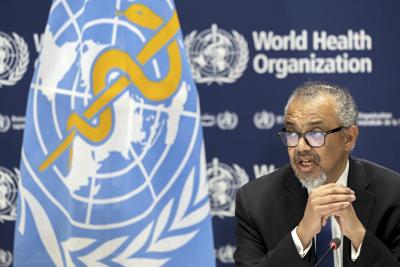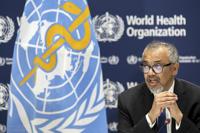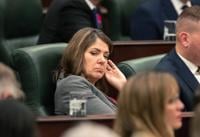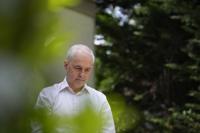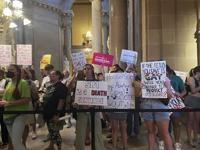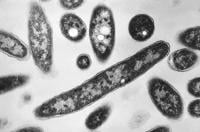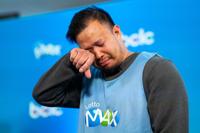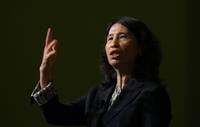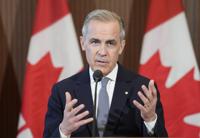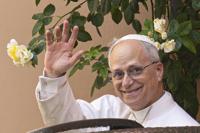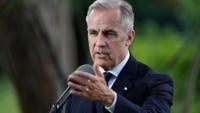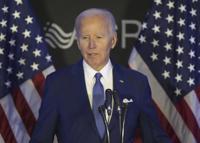GENEVA (AP) — The World Health Organization on Monday opened its annual meeting of government ministers and other top envoys facing one of the most serious crises of its 77-year history in the wake of Trump administration funding cuts and plans to withdraw the United States.
The U.N. health agency this year has seen a plunge in its ability to carry out its sweeping mandate to do everything from recommend reductions in sugar levels in soft drinks to head the global response to pandemics like COVID-19 or outbreaks like polio or Ebola.
Director-General Tedros Adhanom Ghebreyesus has been grappling with a response to the U.S. cuts as well as reduced outlays from other traditional Western donors who are putting more money toward defense and less toward humanitarian aid.
Matthew Kavanagh, the director of Georgetown University’s center for Global Health Policy and Politics, said other countries have used the “U.S. disruption” — the cut in aid — “as cover to do their maneuvering, with many countries in Europe reducing aid.”
“The WHO faces an existential crisis that goes well beyond a budget gap to the question of whether this sort of multilateralism can succeed in addressing global health in this new era of nationalism and misinformation,” he said.
“Literally millions will likely die needlessly on the current trajectory and the world’s health ministers do not seem capable of a coherent response,” Kavanagh added.
Pandemic preparedness on the agenda
On tap for the nine-day World Health Assembly are two major advances that are aimed to buttress WHO’s financial strength and bolster the world’s ability to cope with pandemics in the future.
Member countries are expected to agree to raise annual dues, known as “assessed contributions,” by 20% to support WHO finances and reduce dependency on governments’ voluntary contributions — which change each year and make up over half of the budget.
They are also expected to agree to a hard-wrought “ ” that was born of a desire to avoid any replay of the patchy, unequal response to COVID-19 when the next — and inevitable, most experts say — pandemic hits.
Among other things, the treaty would guarantee that countries that share critical samples of viruses will receive any resulting tests, medicines and vaccines and give WHO up to 20% of such products to make sure poorer countries can have access to them.
“Every World Health Assembly is significant, but this year’s is especially so," Tedros said in his opening remarks Monday. “At this assembly, member states will consider and hopefully adopt the WHO Pandemic Agreement. This is truly a historic moment.”
Previously, he has said the accord can "make the world safer” by boosting collaboration to prepare for, prevent and respond to pandemics.
The treaty’s effectiveness will face doubts when the U.S. — which poured billions into speedy work by pharmaceutical companies to develop COVID-19 vaccines — is sitting out, and because countries face no penalties if they ignore it, a common issue in international law.
Kavanagh said passage of the treaty “could be a significant victory — evidence that the U.S. government may no longer be indispensable in global health” and could offer an opportunity for developing nations in the “global South” over the longer term.
Management shake-up as budget tightens
CitizenGo, an activist group that supports right-to-life and religious liberty issues, protested against the treaty outside the U.N. compound in Geneva where WHO's meeting was taking place. The rally included a balloon sculpture in the shape of the world and a banner inveighing against “globalist elites” and showing an image of Tedros and billionaire Microsoft co-founder Bill Gates, a major WHO supporter, shaking hands while surrounded by dollars.
“In the aftermath of Covid, the WHO got together and thought was a good idea to centralize even more power,” said CitizenGo campaigner Sebastian Lukomski, accusing WHO of an effort to "remove more fundamental freedoms and not learn from the mistakes that were taking place during COVID.”
In the run-up to the assembly, WHO has been cleaning house and cutting costs. Its management has presented a budget for the next two years at just under $4.3 billion, which is 22% less than originally planned — largely in response to Western funding cuts.
At a meeting on its budget last week, Tedros — a former Ethiopian health and foreign minister – announced a shake-up of top management that included the exit of key adviser Dr. Michael Ryan from the job as emergencies chief.
Tedros said last week that the loss of U.S. funds and other assistance have left the WHO with a salary gap of more than $500 million. WHO is “confident” that it has commitments for 60% of funds for the next two-year budget cycle, but it faces a budget gap of $1.7 billion.

